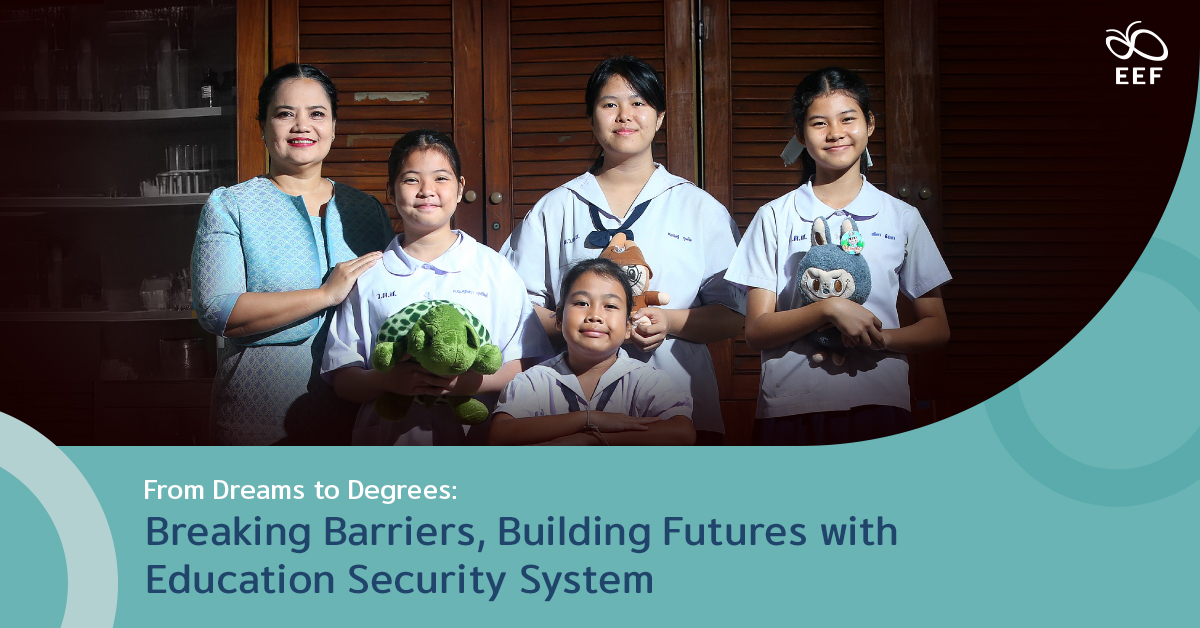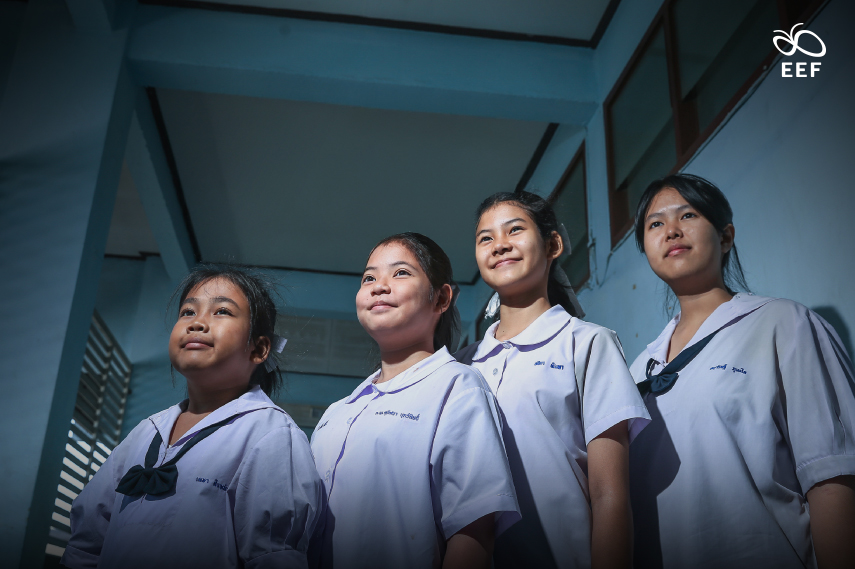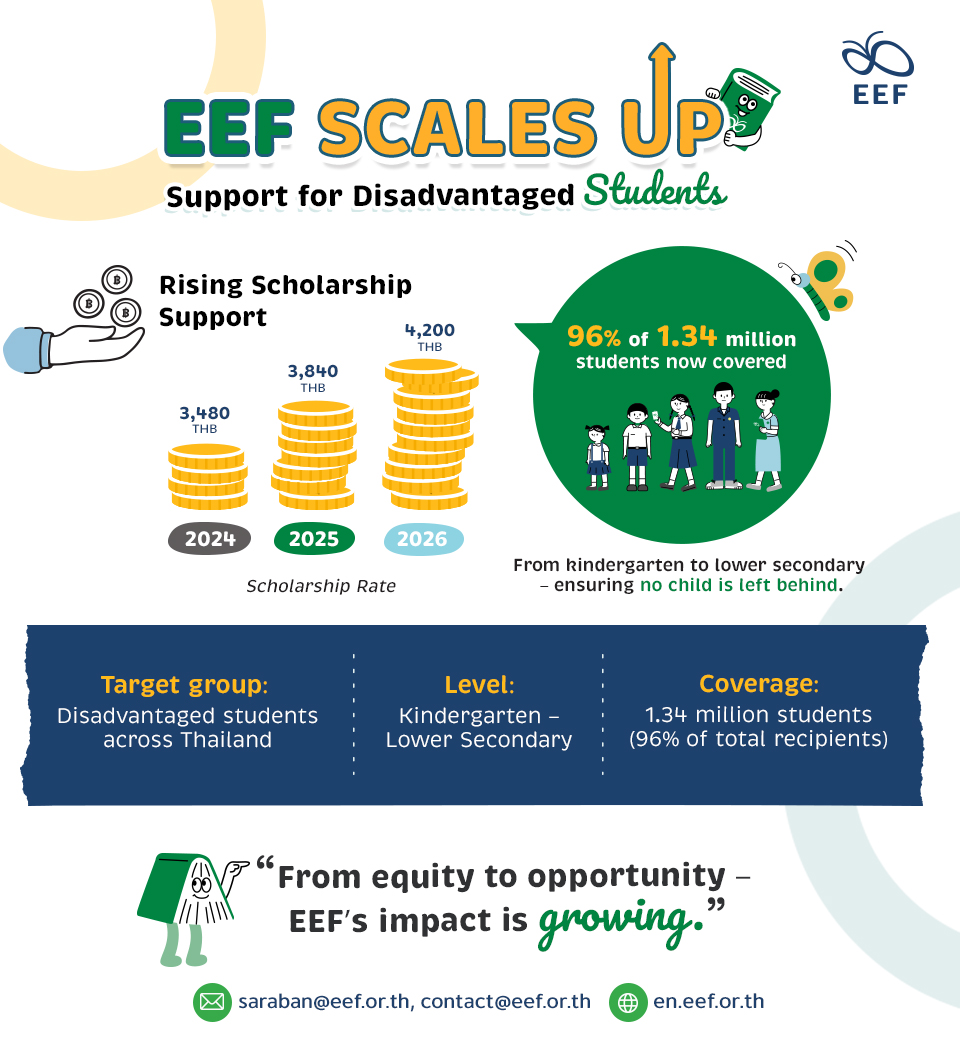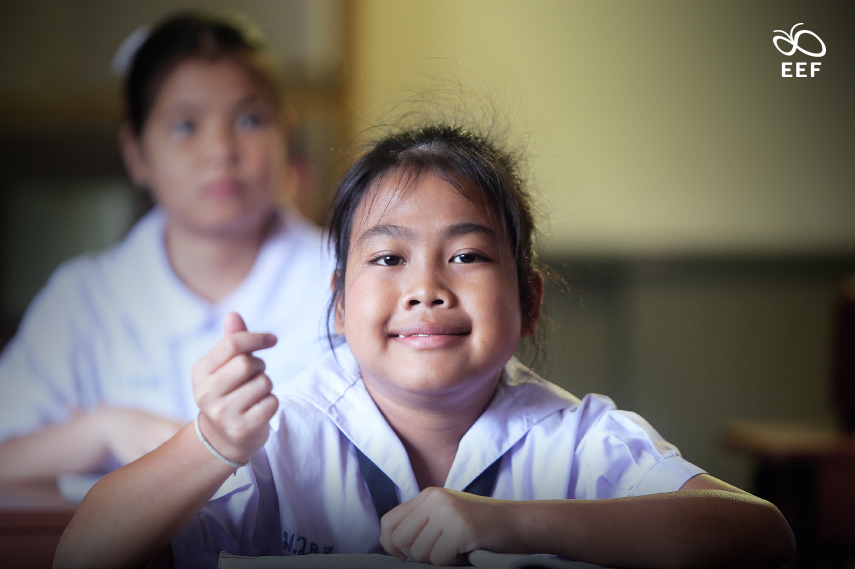
Serving as a critical safety net, the “Education Security System” initiative ensures access to compulsory education for underprivileged and marginalized children. Spearheaded by the “Equity Fund Scholarship” through the “Conditional Cash Transfers” (CCT), it provides comprehensive support throughout their educational journey, from early childhood to higher education, aiming to eliminate barriers and promote equal opportunities for those in greatest need. Focusing on students affiliated with six key educational sectors — namely the Office of the Basic Education Commission (OBEC), the Department of Local Administration (DLA), the Border Patrol Police (BPP), the Office of the Private Education Commission (OPEC), the National Office of Buddhism (NOB), and the Bangkok Metropolitan Administration (BMA) — securing a seamless 20-year educational journey.
On this year’s Children’s Day, the critical role of the scholarships in shaping children’s futures comes into sharp focus. For many, their aspirations of pursuing education beyond secondary school face the obstacle of financial realities. Some students dream of attending a larger school as a stepping stone to university, but the prospect of mounting costs — from tuition fees to accommodations and books — makes them question whether that dream will ever be realized. Some students, driven by the desire to support their family, aspire to specific high-demand fields in the hope to land a lucrative job and build a better future, yet the fear of expensive coursework and accumulating debt looms large, clouding their ambitions. Meanwhile, some students dream of pursuing vocational careers, eager to gain practical skills that could change their lives, but the specter of financial burden of training and certification threatens to block their path. For them, every step forward feels like a financial gamble, and the weight of uncertainty only intensifies the challenge.

Yet, scholarships serve as a powerful tool in breaking down these barriers — none more so than the Equity Fund Scholarship by the Equitable Education Fund (EEF) Thailand. Unlike traditional scholarships, this one-of-a-kind initiative asks for nothing in return except one simple commitment: recipients must maintain an 85% attendance rate. By easing financial pressures, they enable students to remain focused on their education rather than their economic struggles.
However, while Equity Fund scholarships provide relief, systemic challenges persist: only one in ten impoverished students manages to pursue higher education, and education expenses consume 22% of their household income, compared to just 6% for wealthier families. The financial strain is further exacerbated during transitions between educational levels, when new fees and travel costs lead to the highest dropout rates. Even those who continue often face mounting obstacles that eventually force them to abandon their studies.
Amid these challenges, the Equity Fund Scholarship remains a critical safeguard; while gaps in support still exist, the fund ensures that students can stay in school through compulsory education. Nationwide teacher-led home visits and a Proxy Means Testing-based screening process allow educators to assess family circumstances and provide scholarships or other forms of assistance. These interventions help ease the financial burden on parents, reduce absenteeism, and increase overall educational completion. In doing so, the initiative continues to serve as a key pathway — one that not only keeps students in school but also opens doors to higher education and employment opportunities, reinforcing the transformative power of a comprehensive “guaranteed opportunity” system in shaping brighter futures.

To fully realize these opportunities, the EEF, in anticipation of such challenges, has proactively increased scholarship rates to 3,480 Thai Baht per semester for 2024. With further increments planned — 3,840 Thai Baht in 2025 and 4,200 Thai Baht in 2026, this surge in funding ensures that 1.34 million disadvantaged students, or 96% of recipients, from kindergarten to lower secondary school receive vital resources. These enhancements provide everything from meals to transportation and educational supplies, ensuring that students stay in school and pursue their dreams. With these scholarships, the future becomes not just a possibility but a promising reality, fostering a brighter, more prosperous tomorrow for all.
Nevertheless, financial support alone is not enough; a truly comprehensive support system must integrate data across schools and employers, aligning children’s interests and skills with suitable educational tracks. Without scholarships, many students would likely drop out before completing secondary education, with a significant portion of dropouts entering low-income jobs to support their families and remaining trapped in the inherited poverty cycle. Expanding opportunities beyond traditional schooling — through work-integrated learning, vocational training, or alternative education models — further ensures that students not only stay in school but also secure sustainable futures.

A model for such an evolved system can be found in the “Program of Advancement Through Health and Education” (PATH), launched by the Jamaican government in 2002. As a CCT program, it is designed to support vulnerable households and break the intergenerational cycle of poverty. By improving educational attainment, enhancing health outcomes, and reducing child labor through mandatory school attendance, PATH has become Jamaica’s flagship social assistance initiative. With backing from the World Bank and the Inter-American Development Bank (IDB), the program provides cash grants to around 350,000 beneficiaries. Applicants are assessed through a Proxy Means Test, with benefits provided for four years, followed by reapplication and reassessment. Its conditionalities — such as requiring 85% school attendance for children over six and adherence to preventive health schedules for younger children — ensure that educational and developmental goals are met. This targeted and data-driven approach closely aligns with the mission of the EEF, which is dedicated to improving educational outcomes and addressing inequality, particularly by supporting disadvantaged communities.

Through its Education Security System, and specifically the Equity Fund scholarships, the Equitable Education Fund (EEF) Thailand provides a vital safety net for children facing socio-economic barriers. By alleviating financial burdens, bridging gaps in access, and ensuring retention in education, these scholarships do more than fund schooling; they shape a more equitable future. Ultimately, investing in children’s education is an investment in societal transformation. By keeping students engaged in their studies, supporting their ambitions, and removing financial obstacles, the Equity Fund is not just a scholarship initiative; it is a fundamental mechanism ensuring that no child is left behind.
All For Education is all about people; only when all is in for education is Education For All. Join the movement to reduce educational inequality. Support the EEF by donating to fund research, partnerships, and assistance for children, youth, and adults in need of educational support. Click the link to contribute today and help create a society where education is open and equal for all. Together, we can make a lasting impact.

